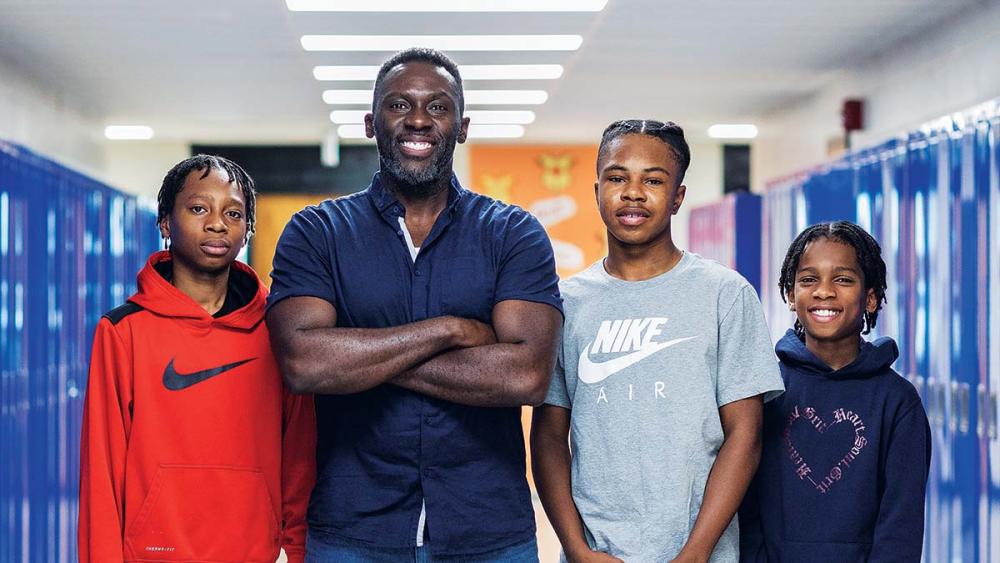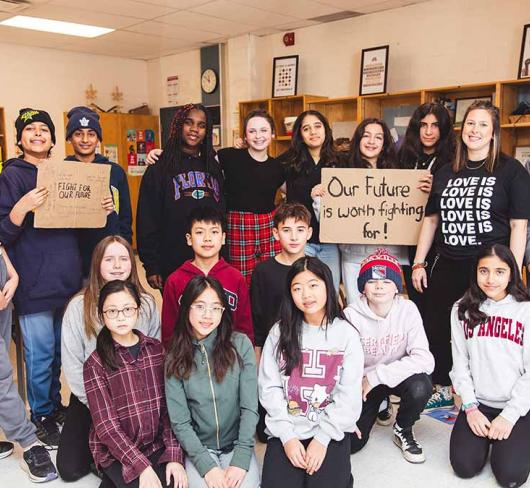
Photo by Christine Cousins
The Power of Representation
On Saturday October 1, 2022, ETFO hosted an historic event, a public symposium called Generation Black: You’re Next. It was an event I hoped would happen when I was at the beginning of my teaching career but also one that I thought would be increasingly unnecessary. Generation Black was the culmination of decades of outcry from students, parents, communities, scholars and educators. Its main goal was to “address the urgency for recruiting Black teachers and the necessity of retaining Black educators to improve representation of Black people in education.” Held in Toronto, the day included panel discussions with education stakeholders and scholars such as Dr. Carl James (author of the Towards Race Equity in Education Report), Vice-Principal Pierrette Walker-Eniss, Dr. Andrew Campbell (AKA Dr. ABC) and Jhonel Morvan (Nouvelon French Catholic Board Superintendent of Education). The event also enlisted thought-provoking and engaging moderators from the education community including Warren Salmon (ONABSE president) and social justice advocate Nastassia Subban. Adding to the list of esteemed speakers was keynote Wes “Maestro” Williams, Canadian rapper, actor, author and motivational speaker.
In my first year of teaching, I was asked by a Black male elementary school student, “Mr. Mills, what made you want to become a teacher?” My immediate response was, “Well, I just always wanted to be one, and my paternal grandmother ‘back home’ (rural Jamaica) built and worked in a school in her community. So I guess it’s in my blood.” Later that evening, however, his inquiry resurfaced and made me reflect on what may have lay deeper in my pursuit of education as a career path. After much thought, it hit me. Throughout my years of schooling – from elementary to secondary school – I had what would be considered a lot of Black teachers. Four. Two in elementary and two in secondary. I had Mrs. Fraser in Grade 2 and Mr. Cummings in Grade 8. Most significantly I remember how they made me feel and how their mere presence made me want to do my best. Just the fact that they were Black made me feel more present and connected. That kind of familiarity, that visibility and feeling of belonging, cannot be underestimated or quantified.
One memory I have in particular was when I started at my new middle school as a Grade 6 student and saw Mr. Cummings. Seeing this Black man, who always seemed calm and confident with the hint of a Jamaican accent, made me and many other Black boys in our school look at him with reverence! Although he was not actually very tall, he felt like a giant to us. Mr. Cummings taught Grade 8 and coached the senior boys’ basketball team. Before he ever spoke to me, I walked up to him and said, “I have to be in your class when I get to Grade 8. Put me in your class.” He laughed and said, “We’ll see.” So today, if I could answer that same student’s question about why I became a teacher, with certainty my reply would be, “because I had some Black teachers that reminded me… of me.”
Now, having been an educator for more than ten years, I have encountered hundreds of Black students that I assume view me through a similar lens. I can see the excitement in their faces when they ask me my name or tell me that they have a sibling or cousin that told them about me. Along with the excitement is a subtle look of relief and trust. I can only guess that the sense of relief they feel is because there is someone in the building they can, at least, visually connect with and, at best, culturally connect with. I have seen the impact I make on Black students in my classes over the years. I can tell that they are working hard academically, but there is also the comfort that they clearly have with me. They want to get to know me personally. They ask me personal questions like how old I am, where I grew up, if I have kids, what sports I like and even what television shows or video games I like. Black students will pull me aside individually or in small groups and ask me what my thoughts are on societal or cultural issues happening in the Black community or to the Black community locally, nationally or internationally. With any of the scenarios, I am as open and honest as I can be with them because I know they take to heart what I say and do.
The same sense of relief and trust is something I experience with the parents and guardians of the Black students I interact with. Due to many, many years of now well-documented negative experiences and outcomes for Black students at the hands of education institutions, the relationships between parents and guardians and the education system are severely strained. As a result, navigating and trusting the institutions that have historically and presently caused harm to Black students and families is complex. This is not to say that white or other racialized teachers cannot be trusted by Black parents. Many of these teachers make a positive impact and I see first-hand the care and effort many white and racialized teachers put into ensuring there are equitable outcomes for all, and in particular for Black students. However, the negative perceptions, experiences and now growing data to support the distrust are hard to ignore. As a Black teacher, there is an inherent belief from parents and guardians that I will have the best interests of their children in mind, more so – correctly or incorrectly – than a teacher from another racial group that does not reflect them.
Although the focus of Generation Black was to highlight the need for more Black educators to be encouraged to enter the field and actually be hired by school boards, this is not solely for the benefit of the Black students and families in their schools and respective communities. The presence of more Black educators across school boards is important regardless of the composition of the community. There is abundant research that tells us that increasing the number of Black educators teaching all students has universal positive impacts. We need the perspectives and life experiences of Black individuals in all of our public schools. This is essential to a holistic experience for all students.
The perception of how students would view me is something that I took into account when deciding which path I would take as an educator. In the media, the representations we see of Black people are largely negative or stereotypical (sports and entertainment figures). Knowing this, I was intentional in the subjects I chose to teach. Although I love sports and would have enjoyed a career as a physical education teacher, I wanted to pivot from that and teach core academic subjects such as language arts, mathematics and science. It was important, even critical to me, that all students saw me in this light with the intent of showing them that Black men are not a monolithic group. It is my belief that the tapestry of the individuals students receive their education from is one better formed when woven with a diverse cultural thread. Black educators are one of those threads, but they are unfortunately significantly underrepresented.
I was fortunate not only to be an attendee of the Generation Black symposium, but also to serve as a panelist for one of the discussions. Our panel talked about why there are so few Black male teachers in public education and how to better recruit them to the profession. These are questions that I have wrestled with and have recently begun to tackle in my school board. In my experience, the same negative encounters that many Black male students face in the school system prove to be barriers to even consider teaching as a profession. Logically, it would be hard to convince anyone to willingly participate and engage in a system where there may have been past harm. As a pilot project in my school board, and with the support of colleagues, I have developed a program where Black students learn about the teaching profession through workshops with Black educators. My hope is that together we can showcase how rewarding a career as an educator can be.
For those who say that such an endeavor is a laborious undertaking, there are less formal things that can be done to help achieve this goal. Simply pulling aside a Black student in your class, school, family or community and suggesting education is a career they should consider may put the wheels of possibility in motion. There is a lot to be said for the impact of tapping someone on the shoulder and this is something any teacher can do, regardless of race. However, imagine how much more willingly this suggestion might be received when delivered by someone who reflects the student. My elementary school teachers, Mrs. Fraser and Mr. Cummings, and my secondary school teachers, Mr. Graham and Mrs. Hoyte, influenced me to enter the field of teaching without directly speaking to me about it. It is my hope that there is a combined effort on the part of all teachers to steer more Black students into a career in education. I hope that real, targeted discussions will one day lead to many more Black teachers and end the need for a symposium like Generation Black to exist.
Chad Mills is a member of the Peel Teacher Local.

